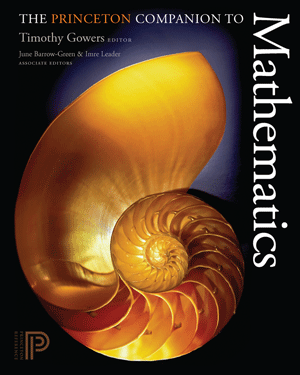
The mail has brought me an early copy of The Princeton Companion to Mathematics, a 1,034-page compendium edited by Timothy Gowers (as well as June Barrow-Green and Imre Leader, associate editors), with contributions from more than 130 other authors. I’ve only just begun to browse through its pages, but already I’m completely charmed. This is one of those books that makes you wish you had a desert island to be marooned on.
In the preface, Gowers is at pains to establish that his book is a companion, not an encyclopedia. What that means, in part, is that authors are allowed to exhibit attitude and personality. Gowers wastes no time in doing so himself. The preface begins by citing a definition of “pure mathematics” written by Bertrand Russell in 1903:
Pure Mathematics is the class of all propositions of the form “p implies q,” where p and q are propositions containing one or more variables, the same in the two propositions, and neither p nor q contains any constants except logical constants….
Russell is allowed to go on in this vein for another eight lines, and then Gowers remarks: “The Princeton Companion to Mathematics could be said to be about everything that Russell’s definition leaves out.”
Since I haven’t yet read more than 5 percent of the book, I’m in no position to review it here, but I think I can say a little more about the nature of what’s in it. Two big sections are essentially reference material: 99 short articles on mathematical concepts (arranged alphabetically) and 96 biographies of mathematicians (arranged chronologically, excluding living persons; the median birthdate is 1822). A third section gives brief accounts of 35 “theorems and problems,” many of them either open or recently solved (the Riemann hypothesis, the Mordell conjecture, Fermat’s Last Theorem) but also including a few classics (the three-body problem, the insolubility of the quintic).
Lots of good stuff in all of those sections, but not a lot of surprises. What I’m really warming up to are the parts of the book where authors are given freer rein to follow their own particular instincts or obsessions and where they express more distinctively personal views.
Gowers himself wrote a 76-page introduction that undertakes to explain what mathematics is all about, not only as a body of knowledge but also as a cultural phenomenon and as a way of thinking about the world. (The last section of the chapter is titled “What do you find in a mathematical paper?” At one point, Gowers begins to sound a little like Russell: “The object of a typical paper is to establish mathematical statements.”)
Seven more essays take another stab at introducing mathematics, this time working from a historical perspective. For the most part the sequence of topics follows an uncontroversial trajectory through the past two millennia: numbers, geometry, algebra, analysis, proof. But the editors have also decided to put algorithms on an equal footing with these subjects, a choice that would have been unlikely 50 years ago. On the other hand, the historical progression culminates in “The Crisis in the Foundation of Mathematics.” The crisis in question is that of the intuitionist rebellion and Gödel’s incompleteness results, events of the 1920s and 30s. It’s rather like a political history of the world that ends with the conflict between communism and fascism. But I suppose that the rest of the book could be taken as an effort to fill in the record of what’s happened since then.
The best bits of all come at the end of this weighty volume. Although the Companion claims to focus on “pure” mathematics, 14 chapters on “The Influence of Mathematics” show a definite leaning toward applications. We get views of mathematics in chemistry, biology, economics, statistics, music and art. And there are a few more narrowly focused essays, on topics such as wavelets, traffic and cryptography.
The book’s last section, titled “Final Perspectives,” is where I would recommend beginning. Here are the contents:
- The Art of Problem Solving, by A. Gardiner.
- “Why Mathematics?” You Might Ask, by Michael Harris.
- The Ubiquity of Mathematics, by T. W. Körner.
- Numeracy, by Eleanor Robson.
- Mathematics: An Experimental Science, by Herbert S. Wilf.
- Advice to a Young Mathematician, with contributions from Sir Michael Atiyah, Béla Bollobás, Alain Connes, Dusa McDuff and Peter Sarnak.
- A Chronology of Mathematical Events, by Adrian Rice.
Details: Princeton University Press. ISBN: 978-0-691-11880-2. Price: $99. The book’s web page has PDFs of a few chapters, as well as an interview with Gowers. Gowers also has a blog with a few entries pertaining to the book.

Just a note to say “Thank You” for the post. I went to book website and downloaded the excerpts for some weekend reading.
I hope you’ll post a review of the book when you can. A thousand pages may mean we’ll have to wait a while :-)
I would love a review to if possible.